1029 Redemption in Beijing
My Summer of Love and Misfortune
by Lindsay Wong
Toronto: Simon and Schuster, 2020
$17.99 / 9781534480704
Reviewed by Jessica Poon
*
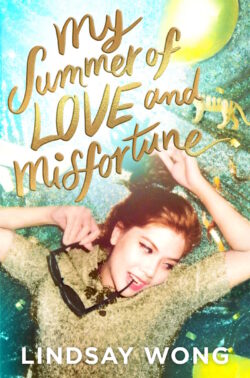 My Summer of Love and Misfortune is an aptly titled comic YA novel with a propensity for food-centric similes, “super” as the omnipresent intensifier of choice, no shortage of hyphens, and featuring Iris Wang, a seventeen-year-old who, contrary to model minority stereotypes, flunks the majority of her courses in her last year of high school. Iris is fun, funny, refreshingly lacking in ambition, as evinced here: “Since kindergarten, I don’t remember ever excelling at anything. Even my macaroni necklaces were subpar” (p. 174). She can also be downright infuriating with a fundamental lack of self-awareness, although that, too, is a source of comedy.
My Summer of Love and Misfortune is an aptly titled comic YA novel with a propensity for food-centric similes, “super” as the omnipresent intensifier of choice, no shortage of hyphens, and featuring Iris Wang, a seventeen-year-old who, contrary to model minority stereotypes, flunks the majority of her courses in her last year of high school. Iris is fun, funny, refreshingly lacking in ambition, as evinced here: “Since kindergarten, I don’t remember ever excelling at anything. Even my macaroni necklaces were subpar” (p. 174). She can also be downright infuriating with a fundamental lack of self-awareness, although that, too, is a source of comedy.
This book is not a representation of all Chinese adolescents and to interpret it as such will only lead to narrow-minded woe; rather, this book is an example of one fictional character’s experience as a Chinese adolescent. Some of it will be stereotypical; some of it won’t be; some of it will be adolescent without any of that adolescent-ness necessarily being Chinese. As Alexandra Chang writes in her debut novel, Days of Distraction: “It is difficult to parse which parts of me come from my family, from being Chinese, from being Asian American, from being American, from being a woman, from being of a certain generation, and from, simply, being” (p. 142).

After failing to get into an Ivy League school like Yale, and basically every other school, Iris is sent to Beijing to “learn how to be Chinese,” where she learns that her father’s half-brother (theretofore unknown to her) is well, a crazy rich Asian. Her cousin, Ruby, far from being welcoming, has a passion for ludicrously specific dog grooming and is a parody of vengeance, going so far as to snip Iris’s clothes. Iris’s redemptive arc is catalyzed by her falling in love with a surprisingly Chinese Parent Approved boy — the antithesis of Peter — who also happens to be her Mandarin tutor. Social media use is rampant in the book, sometimes to great comic effect (e.g. when Iris earnestly asks “what” Freud is. Elsewhere in the novel, Iris also evinces a complete ignorance of Marcel Proust, which I suppose is fair enough). But can changing your locale change who you are? It is a popular misconception that generally leads to the depressing dénouement that, wherever you are, there you go. But new places spur new anagnorises, namely that being Chinese is not some monolithic homogeneity excluding self-professed bananas (Chinese on the outside, white on the inside); being Chinese isn’t synonymous with being boring or high-achieving; and, crucially: boys aren’t the most important thing.
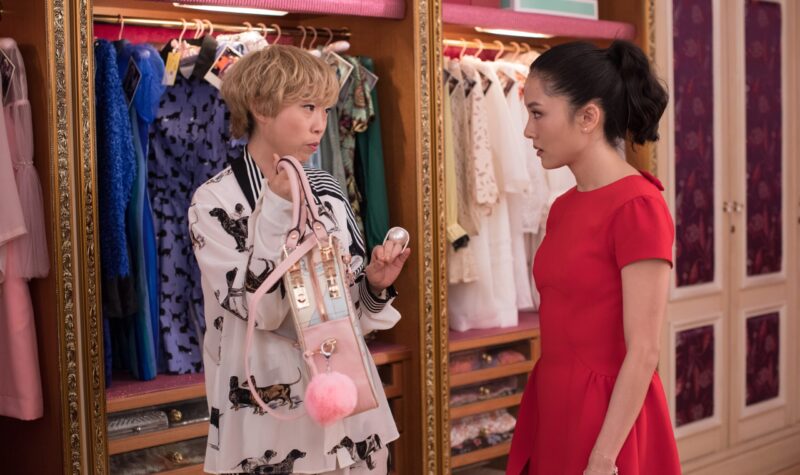
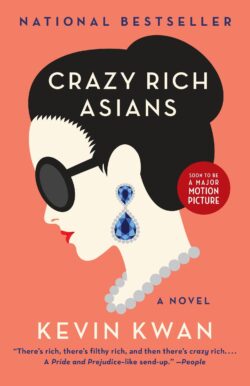
Comparisons to Kevin Kwan’s Crazy Rich Asians are inevitable. In the film adaptation, Awkafina’s character, Peik Lin, casually mentions eyelid tape as a nonchalant aside in a litany of beauty rituals that Constance Wu’s character, Rachel, ought to undergo. It’s the kind of detail a Western audience might not even notice, let alone realize the significance of. What is eyelid tape for, but to turn an Asian monolid into a wider-eyed, more Western-looking eye? (For anyone who doesn’t know what a monolid is, please ask the search engine of your choice. And yes, there are many East Asians with natural double eyelids, and, not uncommonly, one double eyelid and one monolid. The double eyelid is such a taken-for-granted feature that for the most part, only Asians and maybe your odd enlightened make-up artist — usually Asian — will address this matter. The number of times I have spoken to a white person who expressed utter ignorance over the double eyelid, a feature they had, is staggering).
Naturally, such a simplistic interpretation with a Eurocentric heuristic is problematically lacking in nuance. Not everybody who dyes their hair blonde, after all, is trying to look like Hitler’s wet dream; not every person of colour who goes blonde is brimming with internalized racism and Aryan ideals. On the other hand, how can one be so certain that societal ideals of beauty have zero affect on one’s own beauty ideals when they happen to conveniently match up? In other words, if society promulgates the notion that blonde is superior in beauty, and you, too, also believe blonde is more beautiful; well, can you truly confidently proclaim that the former has absolutely nothing to do with the latter? It strikes me as improbable. Just as nonchalantly as Peik Lin, Iris notes that “The lady at Sephora had tried to teach both of us — small wingtips, followed by fluttery false lashes for old-school Hollywood prom glamour. Makeup tips to make our Asian eyes look bigger” (p. 7). The implication, of course, is that the lady at Sephora failed in the same way that beauty ideals have failed to recognize Asians as anything more than tokens for good optics.
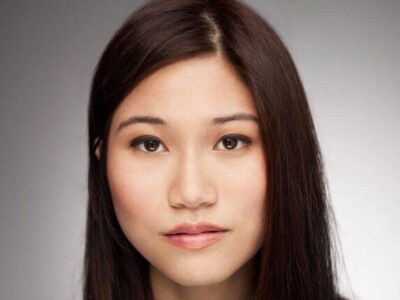
Often, I felt like I was reading the accounts of Becky Bloomwood, the incorrigibly oniomania-riddled protagonist of Sophie Kinsella’s Shopaholic series, right down to the astronomical Vera Wang dress splurge (part of me believes that Wong was doing an homage to Kinsella with that particular detail). I am making this comparison both in earnest and as praise; there are few books that understand the minutiae of sartorial hedonism the way Becky Bloomwood does and the same applies to Iris Wang, whose access to a credit card with no apparent financial limit bespeaks both parental folly and immense privilege. Of course, the problem with privilege is manifold, but here’s one chief problem: privilege rudely enters a room, seemingly obliterating all other discussions, which is emblematic of the decade we’re in; that, however, is not my intention. When I mention that someone is privileged, I am not shaming them or robbing them of the right to be miserable. As Blythe Roberson writes in How to Date Men When You Hate Men, “People who are rich and hot and white are allowed to be sad and victimized in their personal life. Just because you’re privileged doesn’t mean your life is perfect, as many white men have shouted at me” (p. 241). Iris’s life is far from perfect: she lacks a high school diploma and her boyfriend, Peter, is committing infidelity with none other than Samira, Iris’s purported best friend since second grade.
Of course, being flagrantly unaware of your privilege is a major social faux pas. Of course, there is always somebody with more privilege and wealth than you, leading otherwise privileged people to feel bereft. In other words, Taylor Swift can look towards Jeff Bezos and well, Bezos can have a good hard look in the mirror and donate half his profits to fighting the Anthropocene havoc, better known as climate change. One can hope, anyway. Iris is not from an obscenely wealthy family with eighteen yachts, which seems to be the starting point for what constitutes rich in certain circles; however, a credit card for a seventeen-year-old girl whose brain is not fully formed, is unquestionably foolhardy and also, yes, as previously charged, a real sign of socioeconomic comfortableness on her family’s part. A more generous interpretation? Iris believes that money can buy love, which is nominally and morally egregious-seeming but occasionally true in practice (see: how diamond rings became valuable. Let’s just say it wasn’t geologically intrinsic, but a feat of advertising machination from a woman who never married); rather, money can buy a representation of love and sometimes, a representation is sufficient to manufacture love. Like cooking a meal for your loved ones, spending money is a conspicuous way to demonstrate affection, e.g. “He’ll be so excited. He’ll be so grateful. I’ll win a trophy for best girlfriend in the world” (p. 12) Never mind that the tickets to Paris are a birthday present and Iris doesn’t even know when Peter’s birthday is. Iris’s privilege also enables her generosity; she thinks little of giving Samira a dress and paying for all dates with Peter, the latter of which seems more foolish than feminist.
It’s easy to criticize horoscopes for riffing on generalities. On the other hand, if you’re not emotionally invested in obliterating fun in the name of seriousness, it’s easy enough to appreciate that horoscopes can, more often than not, capture something of value, while packaged in a digestible, attention-span-friendly dosage catering towards the perennial quest for self-knowledge, otherwise known as narcissism, which, contrary to popular opinion, does not have to be a pejorative neurosis resulting in your own reflection-gazing death. Not long ago, I read a profile of a Taurus that was so accurate that I couldn’t simply chalk it up to, “Say enough general stuff and something will hit the wall with more accuracy than spaghetti.” I felt seen. But I also know a lot of Tauruses, and the description certainly did not fit all of them like an uncomfortably snug glove. Throw enough spaghetti; some of it might stick. And no: that is not the way you should identify whether the pasta is al dente.
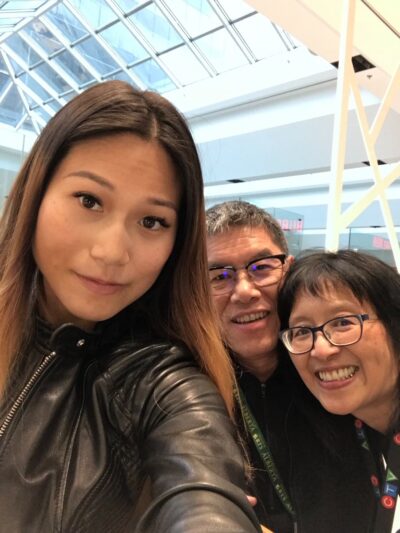
The Chinese zodiac suffers and thrives on the same kind of foibles: they can be thrillingly specific and uncannily prescient; they can be erroneous to hysterical imprecision; does a female born in the year of the Rooster actually constitute a chicken? Questions — so many questions. All I can say is, my mother is a rabbit and my father is a rooster (like me) and their primary form of communication is arguing. The Chinese zodiac can attest to this apparent incompatibility. Iris is a “flower-hearted Tiger girl . . . [which] means that I’m destined to pick loser boys and never listen to my parents” (p. 1). Seems like zodiac determinism, doesn’t it? But maybe there are kernels of legitimacy.
From the onset, Iris’s beau, Peter, is nothing special. Her mother advises her against Peter; Iris is inclined to believe her mother’s rebuke is because Peter is white. Of Iris, Peter says: “You’re superficial, self-absorbed, and you kind of think the world revolves around you” (p. 15). Doesn’t every teenager? And what does it say about Peter that his apparent condemnation does not result in a more considerately timed break-up, rather than waiting to be caught amorously with none other than Samira? Peter adds: “You’re narcissistic, Iris. And vapid. You just try too hard” (p. 15). Iris’s response is measured: “How can I be all these things? I’m just one person” (p. 15). There’s a germane quote from Taxi Driver, a movie I possess controversial hatred for, regarding the multifarious scope of an individual: “He’s a prophet and a pusher, partly truth, partly fiction. A walking contradiction.” Or, if you prefer Whitman: “I contain multitudes.” Iris, vapid she may be, but she, too, contains multitudes. Vapidity is not one-note, but a note among many. She is a self-described banana. She possesses insight when it comes to the monolingual and the polyglot: “… people who are second-language learners seem to know more thesaurus-sounding words than I do. How is this possible? Isn’t English vernacular something you absorb through the osmosis of peers and social media celebrities who slowly replace your parents?” (p. 185). It’s true. When I was an English tutor, I was constantly besieged with technicalities that flummoxed me, an anglophone from the start. Who needed to know grammatical terms when I already spoke with correct grammar? I have since, thankfully, largely corrected this conceit and Iris, eventually, comes to acclimate herself to Mandarin.
Iris’s commentary on the burdens of Generation Z are witty: “Why does Generation Z have to solve the issues of all the past generational alphabets? Is it because there are no other letters after Z?” (p. 204). It’s an excellent point. The burdens of family expectations are written with humour and heart:
Why does my dad think I’m smarter, better, and more capable than I am? Why couldn’t he just think I was a humongous loser and none of us would even be having this shitty conversation? The truth feels slimy, a lot like eating potato salad that has melted in the sun. . . . Don’t they know that expectations can lead to multiple and long-lasting disasters for future generations? How selfish can they be? (p. 171).
She compares herself, in earnest, to Gandhi. She’s guilty of internalized racism, e.g., “You want me to date a geeky, boring Chinese dude!” (p. 21). Falling for a “Chinese Parent Approved” boy goes against historical precedent, but so, too, does withholding affections from boys in general.
For the most part, Wong nails the adolescent voice without being patronizing; my only quibble, really, is that a co-dependency on Starbucks seems more Generation X, or even Generation Y, than an affliction someone from Gen Z would have. Gen Z, arguably the most empathetic and environmentally troubled generation, would more likely have a thing for expensive, single origin coffee with ethical considerations; that is, if they drank coffee at all. Then again, considering Iris before her redemptive arc, maybe the Starbucks co-dependency is pretty true to character and a lot of what Starbucks drinks are not, by any traditional measure, coffee.
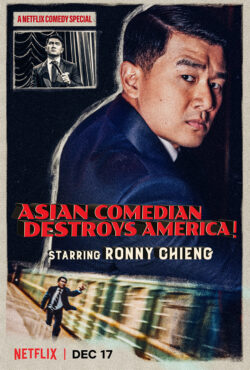
Meanwhile, Iris’s mother is a reliable source of comedy, stating that “Bragging is always better in person … Chinese people invented the sport” (p. 50). As Ronny Chieng says in his uproarious Netflix special, Asian Comedian Destroys America!,
… Asian parents have to brag, okay? And I know every parent has to brag. I’m not trying to take anything away from anyone. I’m just saying Asian parents also have to brag, and, like, weddings is how they do it. Like, Asian weddings for baby boomers, Asian baby boomers, it was the original Instagram, okay? They say shit to your face that reviewers on the internet wouldn’t say.
Although Iris’s parents are clearly less than delighted with Iris’s Yale-less future and her high school flunkie status and Iris’s mother says, in Iris’s presence, “She’s not even going to community college. Our daughter is going to be a loser” (p. 30), the castigation is not, perhaps, as plentiful as you might imagine from stereotypically forbidding Asian parents. If anything, they go out of their way to preserve Iris’s precarious academic status when Samira and her parents drop by for the express purpose of bragging, partly for their own reputation (the achievements, or lack thereof, are taken very personally by most Asian parents), but also to preserve Iris’s own dignity. But who said dignity was predicated on university admission? I’d rather have candour than dignity, myself. Iris, hiding in a closet with Nutella (and without a spoon), admits to everything, and also, satisfyingly, indicts Samira for being a terrible friend.
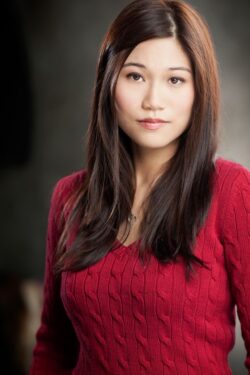
Another gem inspired by Iris’s mother:
My mom’s advice keeps looping in my head like an annoying pop song: Never date dudes who are better-looking than you, I find myself repeating. Otherwise they will football-smash your heart. She also said not to be BFFs with better-looking people, but look at what happened with Samira and Peter, who were really average-looking. “Boyfriends and best friends are not like shopping for fruit,” she once explained. “In this case, a rotten apple is not rotten. Find your ugliest fruit.
I never really understood what she meant.
I just really miss her confusing advice (p. 183).
I laughed out loud at that passage, as I did during multiple instances in Wong’s novel. If you know someone who could afford to benefit from the dismantling of Chinese stereotypes — and let’s face it, you probably do — this book is a rollickingly fun antidote.
*
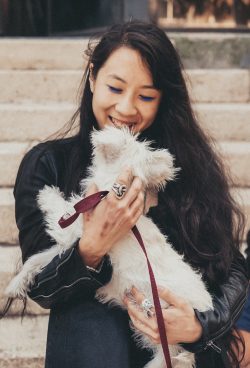
Jessica Poon is a writer, line cook, and pianist in Vancouver. She recently completed her bachelor’s degree in English literature at the University of British Columbia. Visit her website here. Editor’s note: Jessica Poon has also reviewed books by Emily St. John Mandel, Sheung-King, Eve Lazarus, Annabel Lyon, Monika Hibbs, Grant Hayter-Menzies, and Wayson Choy for The Ormsby Review.
*
The Ormsby Review. More Books. More Reviews. More Often.
Publisher and Editor: Richard Mackie
The Ormsby Review is a journal service for in-depth coverage of B.C. books and authors. The Advisory Board consists of Jean Barman, Robin Fisher, Cole Harris, Wade Davis, Hugh Johnston, Patricia Roy, David Stouck, and Graeme Wynn. Scholarly Patron: SFU Graduate Liberal Studies. Honorary Patron: Yosef Wosk. Provincial Government Patron since September 2018: Creative BC
“Only connect.” – E.M. Forster